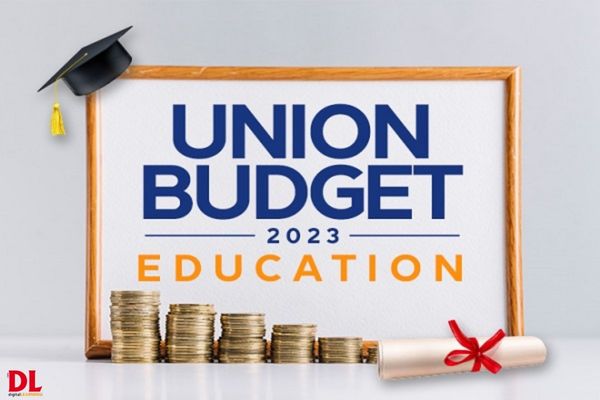
The education sector is on the path of a massive transformation. From upskilling, and reskilling to adapting to digital education– the sector is on the verge of changing for good. All eyes are hoping for some significant announcements from Union Budget 2023. A year after the all-time high allocation of budget to the education sector, educationists are longing for a mega-allocation this time also.
Investing in the education sector is investing in the next generation which will drive the future of the country. As per the recommendations of National Education Policy 2020, the education budget should be ideally 6 per cent of the GDP. Though the parameters are not yet met; educationists and teaching practitioners have high hopes this time that the education sector should be put in the priority segment and should be allocated a good amount.
Also read: FM doles out ‘digital gifts’ for education in Union budget
In the same context, Sheeba Chauhan of Elets News Network interacted with various educational institutions both from the higher education and the school education segment. Edited excerpts:
Jonali Das, Principal, Modern English School, Kahilipara shared, “The Indian education segment expects significant announcements from the Union Budget 2023 to expand the horizon of quality and affordable education in the country. Increased budget allocation, holistic training of teachers, special tax incentives, and facilitating e-learning are some of the long-pending demands of the sector, and it would be a welcoming move if the upcoming budget addresses them.
education segment expects significant announcements from the Union Budget 2023 to expand the horizon of quality and affordable education in the country. Increased budget allocation, holistic training of teachers, special tax incentives, and facilitating e-learning are some of the long-pending demands of the sector, and it would be a welcoming move if the upcoming budget addresses them.
The education landscape in the country is also anticipating the announcements of new schemes for effective implementation and accomplishing the end objectives of NEP 2020. Furthermore, an enhanced focus on the mental well-being of students is the need of the hour. We are optimistic that the Union Budget 2023 will emphasise the overall development of students.”
Dr Maithili Tambe, CEO, The Academy School, Maharashtra shared, “Education needs a flip in terms of budget allotment. Last year, Education was allocated only 2.6% of the total budget. The percentage should improve considerably since the future of India depends a lot on the educational progress of the youth. The biggest expectations of the industry would be modifications in the GST on educational services. The sector expects removal or at least a considerable reduction in GST.
a flip in terms of budget allotment. Last year, Education was allocated only 2.6% of the total budget. The percentage should improve considerably since the future of India depends a lot on the educational progress of the youth. The biggest expectations of the industry would be modifications in the GST on educational services. The sector expects removal or at least a considerable reduction in GST.
The education sector also requires the allocation of funds to safeguard the mental health of students. By setting up labs or facilities offering effective solutions to troubled students, the future of a student can be secured, and ensure the right mindset is nurtured in the student.
The government should focus on empowering the universities and lay emphasis on able-faculty development and infrastructure. Post school education, students tend to go abroad for higher education which does not serve the purpose of the education sector. According to a report, opportunities of USD 17 billion of potential revenue from students were missed by travelling for further studies. With better university education, that can stop.”
Naman Jain, Education Policy Expert and Director (Development), Silverline Prestige School, Ghaziabad shared, “The success of NEP lies in a sizeable fund allocation for the professional development of teachers at the public school level.
With the introduction of NEP, India is fast moving towards achieving its goal of establishing a world-class education system and drastically transforming the literacy rate. While the last few budgets have effectively addressed infrastructure building and teacher remuneration at the public school level, the need of the hour is to pay attention to the professional development of teachers. By preparing skilled and industry-ready teachers of tomorrow, India can accelerate its process of making its public schools the frontiers of Modern Learning. We expect a sizeable investment of at least 2-3% of the total funds allocated for the Department of School Education and Literacy in the professional development of public school teachers. As NEP addresses a big shift from mark-based to a skill-based approach to learning, the time demands extensive professional development mechanisms for the teachers of the New Bharat.”
Bharat Mathukumilli, President, GITAM and Founder, Kautilya School of Public Policy shared, “In the Union Budget 2023-24, we expect a budgetary fillip to be provided to all areas within India’s education sector. The budget committed last year to the education sector was 2.6%. The expectation is that at least 3-3.5% of the budget will be allocated to be spent on education, if not 6%. There is an urgent and important need to transform the education system. For example, modern tools like ChatGPT require institutions to have a strong technology infrastructure and skilled human resource teams that understand how to deal with this rapid change in technology. The government has the desire to increase the gross enrolment ratio (GER) in higher education to 50%. However, the institutions that are fuelling this growth are largely private institutions. On the contrary, the support they get is very limited.
“Speaking of intellectual capital, such as access to academic databases, journals and books, if India could invest in them at a national scale and make them available to institutions, it will go a long way in transforming the ecosystem. In addition to this, if low-cost funds could be made available to institutions committed to excellence, by the government, the institutions will be able to grow much faster.”
When we move forward towards the higher education segment, they have their own set of expectations considering the changing landscape of higher education institutions (HEIs) in India post-NEP and many other transformative moves in the segment. The educators from HEIs expressed their expectations from the upcoming budget.
Dr. V.P. Singh, Professor of Economics, Great Lakes Institute of Management, Gurgaon shared, “One can’t expect much from the Union Budget for the higher education sector. It lacks the financial muscle to make any significant change. Total receipts of the government, excluding borrowings, for 2022-23 is estimated to be around Rs 23 lakh crore, and expenditure around Rs 39 lakh crore. Spending over 35 crore Indian households spreads it too thin. But, the government does have the intent to make significant changes. This adequately reflects through the policy changes and the rapid increases in number of seats for admission. The major spending has to come from the private sector and there is huge demand. Good B-Schools generally receive not less than 5,000 applications against say 240 seat availability, implying a demand of more than 20 times the available supply. With such supply, the higher education market is certainly a sellers’ market. Add to this the fact that last year 11 lakh Indian students traveled abroad for higher education. A rough estimate of the expenditure comes out to be Rs 3000 crores. Indian B-schools keep cribbing about the quality of students they get. Why don’t Indian B-Schools get these students? Are these students who travel abroad inferior? Should not be. Government has to increase the Gross Enrolment Ratio in higher education to 50% by 2035. That is why it is giving approvals of higher intake in both offline as well as online courses. Are Indian institutions ready to absorb this demand? The government does not feel so and that’s why it is letting foreign universities open their centers in India. Instead of waiting for the government to do something it is time that the private sector gears for capturing the huge demand.”
Dr. S Nagendra, Professor & Dean, Department of Management Studies (MBA), Nitte Meenakshi Institute of Technology, Bengaluru shared, “As we approach the 2023 budget, the higher education sector looks forward to a renewed commitment from the government to invest in the future of our students and institutions. With the ongoing impact of COVID-19 on our economy and society, it is more important than ever to ensure that our students have access to the resources and opportunities they need to succeed.
We expect that the budget will prioritise funding for need-based financial aid, to ensure that all students have the opportunity to pursue higher education regardless of their financial circumstances. We expect the government to decrease the GST tax implications on educational needs and services. Additionally, we call on the government to invest in the infrastructure and technology necessary to support a robust and innovative learning environment, as well as support for faculty and staff professional development. The introduction of legitimate tax benefits to further accelerate upskilling within the country should be taken into consideration and should be lowered from 18% to 5%.
Furthermore, we hope that the budget will provide funding for research and development, to support the growth of new industries and the advancement of knowledge. We also hope to see an increase in funding for programmes that support diversity, equity, and inclusion, to ensure that all students have an equal opportunity to succeed.
As a nation, now would be an ideal time to put mental health in the spotlight; this budget should allocate some amount on counselling schools and college-going students. A mandatory and effective counselling programme should be drawn to uplift children from all societies and backgrounds. Furthermore, the budget should have a stipulated allocation towards policies to promote a larger percentage of girls’ education, in the form of scholarships & tax exemptions & more, to achieve the gender-based targets as set by NEP 2020.
In short, the higher education sector looks forward to a budget that prioritises investment in the future of our students, institutions, and society as a whole. We stand ready to work with the government to build a brighter future for all.”
Robin Bhowmik, Chief Business Officer, Manipal Global Education Services (MaGE) shared, “It is important to understand that higher education in India is the norm and not the exception. By investing in the skilling and education of our youth, we will create a more productive workforce and a more inclusive and equitable society. India is a country where highly qualified young professionals often find themselves out of jobs or in jobs far from their qualifications and skill sets; what young Indian professionals need more than ever from the FY 2023-2024 Union Budget is the government’s commitment to increase funding and resources for these programmes, as well as partnerships with the private sector to bridge the skills gap and create quality employment opportunities for all.”























